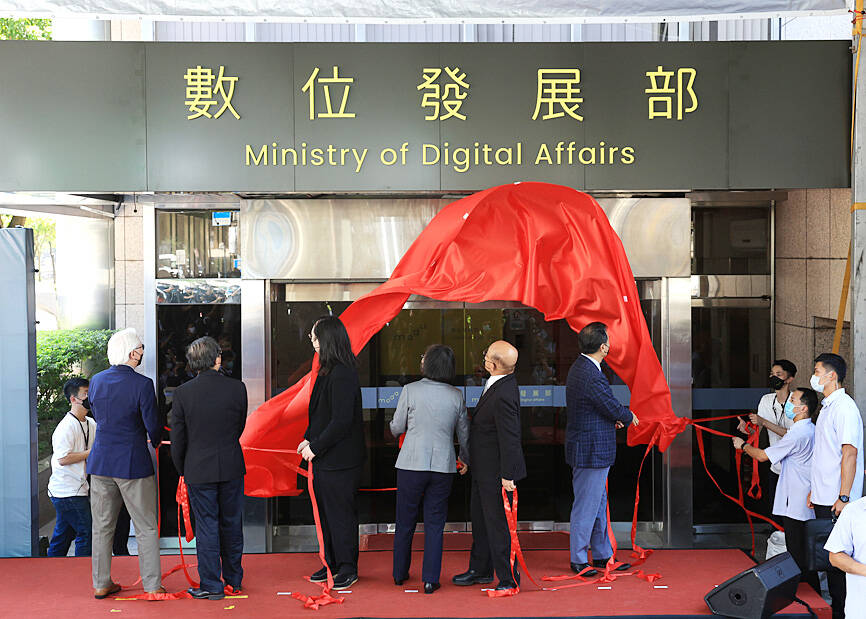Candidates to work at the Ministry of Digital Affairs would not be selected based on their personal ties with other government officials, the Executive Yuan said yesterday.
The ministry, which was officially established yesterday, is planning to hire 300 contract workers, and the process would be in line with government regulations, the Cabinet added.
The statement came after Taiwan People’s Party (TPP) Legislator Tsai Pi-ru (蔡壁如) on Facebook asked why the ministry chose to hire contract workers instead of using other employment arrangements.

Photo: CNA
“Diversifying employment channels is a pretty phrase, but who would know if the move is to benefit affiliates or relatives of [government] employees,” Tsai said.
A Democratic Progressive Party (DPP) official, speaking on condition of anonymity, said that half of the ministry’s staff would be contract workers.
The ministry chose this arrangement as it was stipulated by a draft version of what was later passed as the Organization Act of the Administration for Cyber Security, Ministry of Digital Affairs (數位發展部資通安全署組織法), the DPP official said, adding that the draft was introduced by a group of lawmakers, including two from the TPP, Anne Kao (高虹安) and Tsai.
The source said that the draft stipulated that the ministry should diversify its employment methods and seek to hire talent from the digital technology industry to ensure that Taiwan retains an edge in technological competition.
The draft said that no more than half of the ministry’s employees should be contract workers, citing the Regulations on Hiring Contract Employees (聘用人員聘用條例).
The legislature last year passed the organization act of the ministry alongside two related pieces of legislation — the Organization Act for the Ministry of Digital Affairs’ Information Security Bureau (數位發展部資通安全署組織法) and the Organization Act for the Ministry of Digital Affairs’ Digital Industry Bureau (數位發展部資通安全署組織法).
The legislation allows the ministry and the two bureaus under its administration to each hire up to 100 contract workers.
The source said they do not understand why Tsai first introduced a draft act that allows the ministry to hire contract workers, but then said that such arrangements are illicit.
Premier Su Tseng-chang (蘇貞昌) told reporters that the ministry’s hiring practices would be in line with the law.
Former minister without portfolio Audrey Tang (唐鳳) is to head the ministry, and the proposed budget for the ministry is NT$5.7 billion (US$188.6 million) for next year, or 0.2 percent of the government’s overall budget.
With additional funding from the Forward-looking Infrastructure Development Program, the ministry’s overall budget would be NT$21.8 billion.

Three Taiwanese airlines have prohibited passengers from packing Bluetooth earbuds and their charger cases in checked luggage. EVA Air and Uni Air said that Bluetooth earbuds and charger cases are categorized as portable electronic devices, which should be switched off if they are placed in checked luggage based on international aviation safety regulations. They must not be in standby or sleep mode. However, as charging would continue when earbuds are placed in the charger cases, which would contravene international aviation regulations, their cases must be carried as hand luggage, they said. Tigerair Taiwan said that earbud charger cases are equipped

Foreign travelers entering Taiwan on a short layover via Taiwan Taoyuan International Airport are receiving NT$600 gift vouchers from yesterday, the Tourism Administration said, adding that it hopes the incentive would boost tourism consumption at the airport. The program, which allows travelers holding non-Taiwan passports who enter the country during a layover of up to 24 hours to claim a voucher, aims to promote attractions at the airport, the agency said in a statement on Friday. To participate, travelers must sign up on the campaign Web site, the agency said. They can then present their passport and boarding pass for their connecting international

Temperatures in northern Taiwan are forecast to reach as high as 30°C today, as an ongoing northeasterly seasonal wind system weakens, the Central Weather Administration (CWA) said. CWA forecaster Tseng Chao-cheng (曾昭誠) said yesterday that with the seasonal wind system weakening, warmer easterly winds would boost the temperature today. Daytime temperatures in northern Taiwan and Yilan County are expected to range from 28°C to 30°C today, up about 3°C from yesterday, Tseng said. According to the CWA, temperature highs in central and southern Taiwan could stay stable. However, the weather is expected to turn cooler starting tonight as the northeasterly wind system strengthens again

Taiwan sweltered through its hottest October on record, the Central Weather Administration (CWA) said yesterday, the latest in a string of global temperature records. The main island endured its highest average temperature since 1950, CWA forecaster Liu Pei-teng said. Temperatures the world over have soared in recent years as human-induced climate change contributes to ever more erratic weather patterns. Taiwan’s average temperature was 27.381°C as of Thursday, Liu said. Liu said the average could slip 0.1°C by the end of yesterday, but it would still be higher than the previous record of 27.009°C in 2016. "The temperature only started lowering around Oct. 18 or 19